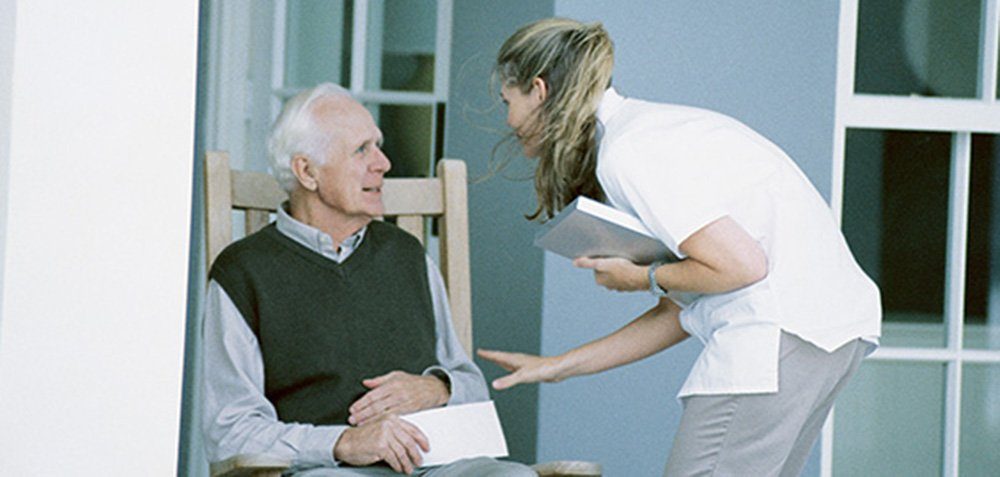Dementia is a devastating condition that affects millions of people in the US and worldwide. The disease slowly robs individuals of their memory, cognitive functioning, and eventually renders the person almost completely dependent upon others for their daily care. Though the causes are not completely understood, caregivers feel the strain of the disease daily as they help those affected with dementia to navigate the simplest of tasks such as getting dressed or eating meals.
Urinary and fecal incontinence can also be present in those who are affected with dementia. Though this loss in bodily functioning may be inevitable, it can be uncomfortable and embarrassing to the patient and the caregiver. Incontinence can be caused by a variety of issues, and it may help to understand some of those causes to help the household cope with it. The National Association for Continence relates that most people wait an average of seven years before seeking treatment. This delay in seeking help often exacerbates an already stressful situation for both patients and caregivers.
Urinary Incontinence
In its simplest form, urinary incontinence is when someone does not have complete control over when he or she urinates. It may appear due to several reasons, and to make certain which one it is, the patient should be examined by a physician as soon as possible.
Stress Incontinence – women who have had a baby or two may understand this type of incontinence the best. A forceful sneeze or cough may cause urine leakage since the muscles in the pelvic region can be loosened by childbirth. Normally Kegel exercises (tightening and releasing the pelvic muscles several times per day) can provide some strengthening, although it may not work for all women.
Urge Incontinence – the urge to urinate may develop suddenly, resulting in urine leakage. Many people who have this type of incontinence are not given ample warning to get to the bathroom in time before leakage occurs. It is fairly common in the elderly, although it can be a sign of a bladder or kidney infection. If an infection is causing the incontinence, antibiotics can generally clear up the condition within a short period of time.
Overflow Incontinence – This type of incontinence is more common in men than women and results from an overfull bladder that does not empty effectively. It results in urine leaking on almost a continual basis. A blockage in the urinary tract system is generally the cause, like an enlarged prostate or other obstruction. A physical exam is a must for this type of incontinence in order to accurately diagnose and treat the condition.
Functional Incontinence – In this type of incontinence loss of bladder control is caused by other conditions. For example, the person who is arthritic and does not move well may develop incontinence due to their inability to get to the bathroom in time. As dementia develops over time, this type of incontinence may be more prevalent and possibly more frustrating to treat since the cause is a symptom of the underlying disease and not easily attributed to an infection or other issue.
Bowel Incontinence – This type of incontinence causes a great deal of distress for many persons with dementia and their caregivers. Bowel incontinence can be partial when only a small amount of liquid waste leaks before toileting. Complete incontinence results when the person is unable to control any aspect of the bowel movement.
Seeking Treatment
In order to understand why someone has developed incontinence, a medical exam is definitely in order. Since there may be special complications due to dementia, it is best to start with the patient’s primary physician since he or she is most familiar with the patient and their health history. He may order a visit to a urologist, a specialist in urinary conditions for men and women. It is important to remember, however, that a urologist is a surgeon and may not focus on non-surgical solutions, like the ones that will be discussed later.
When visiting the doctor, bring a description of how incontinence is affecting the patient’s life, including an overview of their daily routine. Some doctors recommend keeping a continence diary to provide a four or five day “snapshot” of what is happening at home. Be prepared to answer questions like the ones suggested by the National Association for Continence. The questions below are only a few from their suggestions.
How much water does the patient drink every day?
What foods is the patient eating?
Does the patient have any control over urination?
Is the problem better or worse during the daytime or at night?
Is it linked to a physical condition (inability to move quickly, for example)?
When did the incontinence first appear?
Is the patient upset by their incontinence?
How many episodes does the patient have and in what time period?
Does the patient understand the signal or urge to urinate or are they unaware of the need?
Is there a burning or painful sensation when the patient needs to urinate?
Treatment Options
If the incontinence is due to an underlying medical condition, such as a urinary tract infection or a bowel obstruction, treatment can range from antibiotics to surgical intervention. The decision, of course, will be based on the severity of the condition and the best course of action for the patient. It is important to remember that incontinence is not a disease, but rather a symptom of an underlying issue that has developed with the patient.
If a medical condition is readily ruled out, the doctor may move on to other options like medications that treat the bladder’s urge to urinate or the frequency with which the bladder sends the “alarm” to the body that urination is about to occur. These medications are generally anticholinergics and have the effect of reducing frequent urges to urinate when the patient is unable to make it to a toilet fast enough. These urges may be made worse by the dementia since the signal that urination is about to occur may be misunderstood or misinterpreted by the patient.
There are non-medication or surgical methods that can be used to treat incontinence at home. Adaptive clothing may be able to help if functional incontinence is an issue. Replacing hard-to-manipulate buttons and snaps with Velcro and zippers may be a quick fix if it appears that the patient is aware of the incontinence and wants to correct it without too much intervention on the part of the caregiver. This approach gives the patient more control over their environment and encourages independence. It also affords the patient the most privacy which is often a serious source of angst for many patients. There are also incontinence products for all ages and sizes that may be helpful, although the patient may have difficulty understanding their use and disposal. Communicating the need for these products may be a challenge, and the caregiver may need to explain their use more than one time in order for the patient to understand.
Other methods may be home modifications or adding a portable toilet chair to the room(s) where the patient spends most of his or her time. This method is relatively easy to implement, although it may need some additional explanation since patients with dementia wonder why the caregiver is altering the living situation or the layout of a particular room. Any approach that changes the daily routine of a dementia patient drastically should be undertaken thoughtfully and with as much input from the patient as possible.
The doctor may also recommend changes in diet, both fluid and foods, that can help treat incontinence. If bowel movements are not regular or consistent, then changing foods in the diet may make a significant improvement within a relatively short period of time. The patient may or may not resist such changes, especially if he or she has developed a resistance or affinity to particular foods due to dementia. It is important to discuss dietary changes with a physician or dietitian so the patient is still eating balanced meals and snacks. Fluid intake should also be closely monitored.
Caregivers of dementia patients should understand that incontinence may be an inevitable part of the overall cognitive decline. As a person loses awareness of their surroundings, lifestyle, and loved ones, it is not surprising that loss of bodily functioning will also occur. It may be a tremendous source of frustration for both the caregiver and the patient. Communicating the incontinence issues early with the patient’s healthcare team can help reduce some of the frustration that the household may have with the issue. Even though it can be an uncomfortable subject, it is important that the full needs of the patient be addressed. The sooner incontinence is addressed, the quicker the patient and the caregiver can begin to work with options that may reduce the frustration or embarrassment that is involved.
Article courtesy of Sandra Ray, Today’s Caregiver


